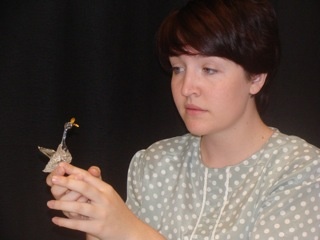THE GLASS MENAGERIE
Uxbridge Centre, 35 Uxbridge Road, Howick, Auckland
12/03/2012 - 18/03/2012
Production Details
“I tried to leave you behind me but I am more faithful than I intended to be.”
Tennessee Williams’ most autobiographical play is a brilliant and compelling portrait of a family in crisis. As the writer returns to confront the past, his family come to haunt the stage…
In the tenement apartments ofSt. Louis, the Wingfield family struggle to make ends meet. AsAmericais ravaged by the Depression, Amanda clings to memories of her idyllic youth in the South, where she was wooed by scores of rich and handsome suitors. With her husband long gone and her own days of courtship over she is determined to find her daughter a husband. But Laura is painfully shy. She plays with her collection of glass animals and lives in a world of her own. And Amanda’s son, Tom, an aspiring poet in a dead-end job, secretly dreams of escape.
The Glass Menagerie is Piece of Work’s second production and follows 2011’s successful production of The Complete Works of William Shakespeare (abridged).
The Uxbridge Gallery
12 – 18 March at 8pm
Tickets: Adults $20, Concessions $15
Bookings through Uxbridge – 535 6467
Amanda Wingfield - Susan Ronn
Tom Wingfield - Matt Halliday
Laura Wingfield - Rebecca Taylor
Jim O'Connor - Ben Van Lier
Lighting and Sound - Tim Williams
Short on dynamics if you know your Williams
Review by Aidan-B. Howard 13th Mar 2012
Tennessee Williams’ The Glass Menagerie is a staple food in the repertoire of ‘American Greats’. Its storyline is simple, yet its complexities are enormous.
An adult son, Tom (Matt Halliday), who is around 22, lives with his sister Laura (Rebecca Taylor), soon to be 24, and their mother Amanda Wingfield (Susan Ronn).
Laura is a wallflower, a shrinking violet, who is lonely and self-effacing because she is what is described as “a cripple”. In fact, her disability is quite minor, but exacerbated by decades of self-doubt and self-belittlement. Her only interests are walking around parks and galleries, and a collection of glass animals: her “menagerie”.
Tom works at a warehouse but dreams of escape and adventure, in the same way that their father abandoned them some 16 or so years earlier. At the moment, his only ‘escape’ is to go to the movies every night.
Amanda is a typical Southern States Christian mother, full of the delusions of the post-war South (with “niggers” as servants) and the reminiscences of “gentlemen callers” of her own and the prospect of some for her shy daughter. Eventually, one such “caller” does arrive, a workmate of Tom’s, Jim Delaney O’Connor (Ben van Lier), although being already engaged, things do not go according to plan.
I certainly find this production very entertaining. The cast are well-spoken and clear, the pace is kept up, the intrinsic humour effective by being understated. They interplay well, both with each other and with the set design (unattributed), which is both minimal and complete. The lighting (by Tim Williams) is effective and moody, but is occasionally off-cue: a couple of times Tom is peaking in the dark.
However, the performances do fall short of what we would expect for Williams. Much of the playwright’s dynamics are lost.
Tom’s character is supposed to be more in control. He is portrayed as somewhat effete under an all-powerful mother, yet Tom plays his mother like a violin; he knows her and her ways, he knows what drove his father away. Halliday also acts the role a little too ‘theatrically’ with the overuse of pauses for emphasis: “after the… fiasco”, “feather the nest and… plume the bird”, “time is the… longest distance”. He also totally downplays one of the most critical lines of the entire play, “People go to the movies instead of moving.”
Laura needs to spend more time playing with her ‘glass menagerie’: it is after all the key metaphor of the play. When her favourite glass animal is broken, the level to which she is distraught is not felt, because her dependency on these ‘substitutes’ has not been highlighted.
Whereas the delusions of Amanda, the mother, are well portrayed, her manipulative nature (which drove her husband away, which set up antagonism with her son and which is the major cause of her daughter’s self-effacement) is only marginally dealt with.
Even Jim, the “gentleman caller”, needs more of an arrogance, as he tells Laura – whom he has met only half an hour earlier – that she suffers from an “inferiority complex” and presumes to tell her how to live her life. Despite the fact that he is actually right, the presumptuousness of lecturing a stranger, especially as a guest in a household which is supposed to be Christian and civil, needs to be highlighted. This would give a greater dynamic to such observations as Laura is the type of girl who needs to be kissed and Jim is not the type to call again.
In short, the cast needs to push the differences and absurdities of interrelationships more, but they seem to hold back and give us a ‘nicer’ storyline.
Nevertheless, as implied earlier, The Glass Menagerie remains enjoyable entertainment. The disappointments will be limited only to those who have studied Williams and American Theatre more academically.
Copyright © in the review belongs to the reviewer






Comments